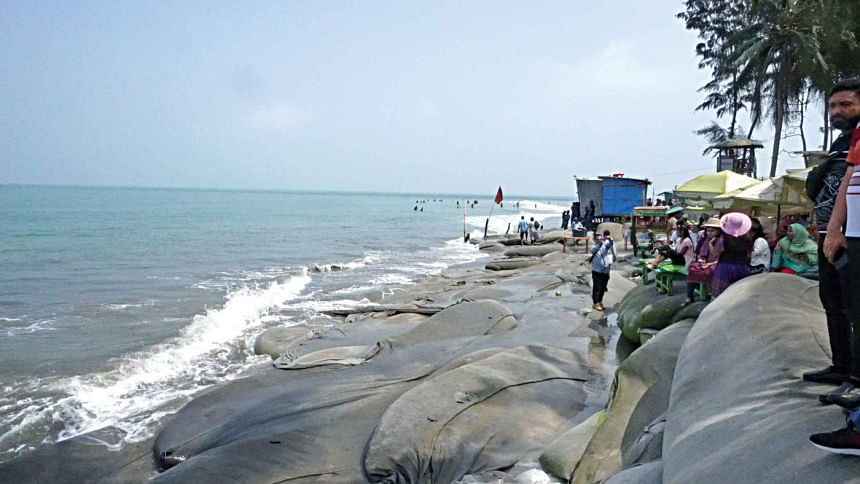‘Heaven on earth’ now haven for plunderers

The movement restrictions and ban on tourist arrival, imposed to curb the spread of Covid-19, on the picturesque Saint Martin's Island have come as a blessing for a few public representatives and their accomplices.
Taking advantage of lax monitoring of the administration during the ongoing second wave of the pandemic, at least three local public representatives have been doing brisk business by openly selling crushed corals, extracted from the nature, to hotels operating on the country's lone coral island.
In their bid to cash in on the burgeoning demand for accommodations on the island during normal times, the criminals are operating a protection racket that controls the illegal trade of construction materials, which are prohibited on St Martin's.
A union under Teknaf upazila in Cox's Bazar, St Martin's was declared an 'Ecologically Critical Area (ECA)' in 1999.
The gang of criminals brings in shipments of various construction materials from the mainland and engage around 150 workers to crush corals after extracting those from the island.
They pay the workers Tk 60 to Tk 70 for each square foot of crushed coral and they later sell those to the hotel owners for Tk 150 a square foot.
As the organised criminals charge about Tk 180 for each square foot of stone chips brought in from the mainland, the demand for 'low-priced' crushed coral rose considerably at construction sites on St Martin's.
The construction works to build around 20 hotels and resorts have been in full swing lately, especially amid the ongoing ban on travel to the island, said locals, adding that the island was similarly abuzz with construction activities between April and October last year when a tourist ban was in force.
Solaiman Haider, director (planning) of the Department of Environment (DoE), said the island was declared an ECA in 1999 and a ban on construction of any concrete structure on St Martin's has been in effect ever since.
Despite the fact, more than 150 concrete structures for different hotels and resorts were built on the island over the past few years and construction of more is underway.
Clearance from the DoE was never obtained by the owners and the illegal construction works go on without any monitoring or enforcement of the applicable laws, he also said.
Aside from destruction of corals of the island, the sand on its beach is being plundered for use in construction, while bushes of screw pine (Keya in Bangla), which surrounds the island and shields its inland from sea storms and storm surges, are being depleted by hotel owners to create sea view for their clients.
All such illegal activities and unauthorised and indiscriminate use of geotextile bags -- filled with sand from the same site -- has been causing erosion to the beach and will ultimately threaten the island's existence, said environmentalists and experts.
When asked, Teknaf Upazila Nirbahi Officer Parvez Chawdhury said although the use of construction materials is banned without approval of the upazila administration and they no longer approve the use of construction materials for building or repairing even non-commercial structures on the ecologically critical island, an organised crime syndicate has been illegally bringing in the materials from mainland and extracting corals from the island for high profits.
Since drives conducted by the administration, located in Teknaf, against the criminals on the remote island often do not bear results, they would make concerted efforts among law forcers and the DoE to stop coral extraction and illegal construction works on St Martin's, the UNO assured.
When reached for his comments over the allegations, St Martin Union Parishad (UP) Chairman Noor Ahmed admitted that a number of hotels and resorts were being built on the island and people with political clouts were bringing construction materials in to the island, violating the ban.
Claiming ignorance of knowledge on involvement of public representatives in the illegal trade of construction materials and destruction of corals on the island, he said, "The DoE or any other government authorities didn't yet send any letter [to us], mentioning that the [ongoing] construction work is illegal.
"They didn't issue any written directive to take action against the work either. Then how would we take action against them?"
This correspondent during a recent visit to the island came across a section on the northern beach (locally known as Dail Para) where sand-filled geo bags were placed in a bid to protect the beach from erosion.
Signs of further erosion of sand were apparent on the beach, in between the geo bags and a resort made by Bangladesh Police.
DoE Director Solaiman Haider said the filling up of the geo bags with sand from the same site catalysed the erosion of the beach.
UP Chairman Noor Ahmed placed the geo bags on the beach and the DoE filed a case against him in that connection, he added.
Asked, Noor Ahmed said he placed the sand bags on the beach to protect a graveyard nearby.
While taking a tour around the island, a good number of screw pine bushes, in front of hotels facing the sea, were found uprooted and removed -- apparently to ensure unrestricted view of the sea from hotel rooms.

 For all latest news, follow The Daily Star's Google News channel.
For all latest news, follow The Daily Star's Google News channel. 



Comments